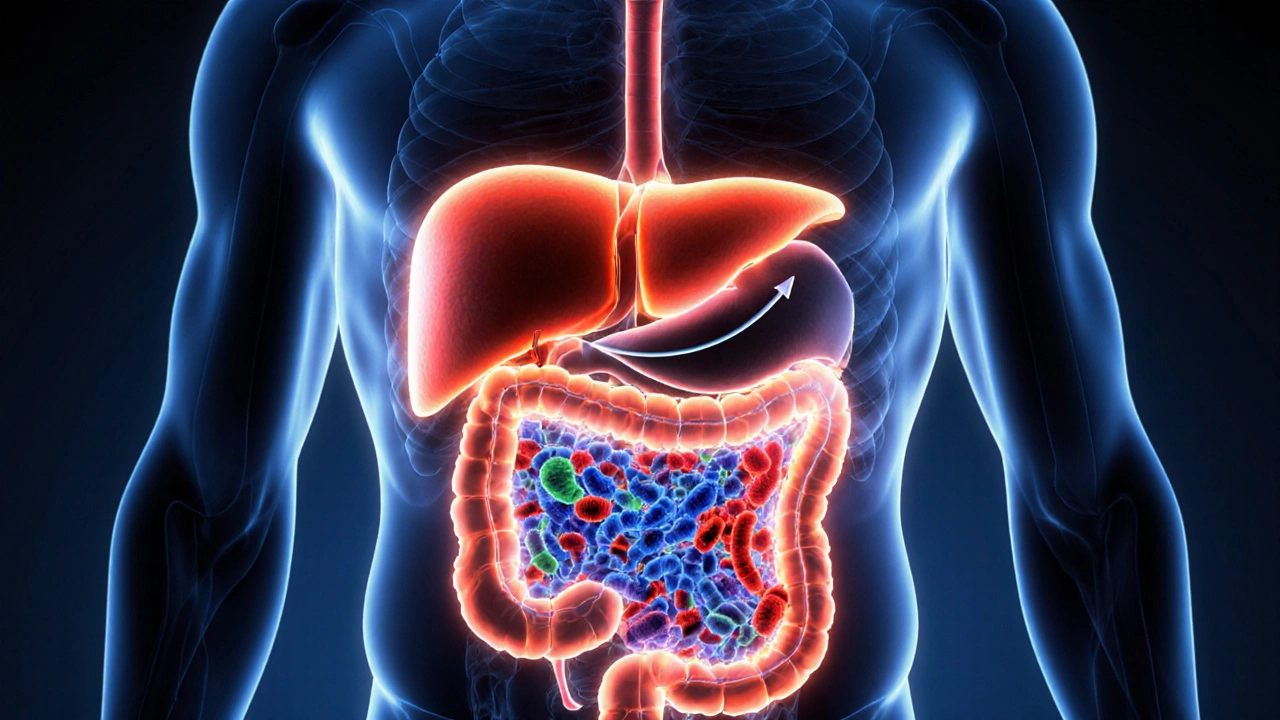- Home
- ::
- Will I Gain Weight After Stopping Metformin? What You Need to Know

Will I Gain Weight After Stopping Metformin? What You Need to Know
Metformin Weight Change Calculator
This calculator estimates potential weight changes after stopping Metformin based on factors discussed in the article. Results are approximate and not medical advice.
Results will appear here after calculation...
Many people who have been on Metformin is a first‑line oral medication for type 2 diabetes that also helps keep weight in check wonder what will happen to the scale once they quit. The short answer: weight can go up, stay the same, or even drop, depending on a handful of personal factors. Below we break down why metformin affects weight, what physiological shifts occur after you stop, and how to keep your waistline stable without the drug.
How Metformin Impacts Your Weight
Metformin does more than lower blood glucose. It nudges several pathways that collectively curb weight gain:
- Reduced hepatic glucose production - less sugar spilling into the bloodstream means fewer calories stored as fat.
- Improved insulin sensitivity - cells respond better to insulin, so the pancreas doesn’t have to crank out extra insulin, a hormone known to promote fat storage.
- Appetite modulation via the gut - metformin alters the gut microbiome and may increase levels of GLP‑1, a hormone that signals fullness.
- Gentle calorie burn - some studies report a modest increase in resting metabolic rate.
Because of these effects, many users notice a slight weight loss (often 2-5% of body weight) during the first six months of therapy, especially if they pair the drug with diet and exercise.
What Changes When You Stop Metformin?
When you discontinue metformin, the body loses those supportive mechanisms:
- Hepatic glucose output rises - the liver resumes its natural, insulin‑independent glucose production, leading to higher blood sugar spikes.
- Insulin resistance may creep back - without metformin’s sensitizing effect, the pancreas often compensates by secreting more insulin.
- Appetite‑regulating hormones shift - GLP‑1 levels can drop, making you feel hungrier.
- Gut microbiota reverts - the composition that favored leanness may change back toward a profile linked with weight gain.
These physiological shifts create a fertile ground for weight gain, but the magnitude varies widely. The key question is: how much of that potential weight gain is inevitable, and how much can you control?

Factors That Influence Post‑Metformin Weight Changes
Not everyone gains weight after stopping the medication. Several variables determine the outcome:
- Type 2 diabetes is a chronic condition characterized by insulin resistance; the severity of your disease matters.
- Baseline BMI (body mass index) sets the starting point for any change.
- Diet quality - high‑carb, low‑fiber meals can fuel weight gain faster.
- Physical activity level - regular aerobic and resistance training can offset the loss of metformin’s metabolic boost.
- Alternative medications - switching to drugs like sulfonylureas or insulin can increase appetite and promote weight gain.
- Stress and sleep patterns - cortisol spikes and poor sleep both encourage fat storage.
Understanding where you sit on each of these axes will help you predict and, more importantly, manage any potential weight shift.
Real‑World Data: What Studies Show
Research on weight trajectories after metformin withdrawal is limited, but a few robust studies give us a picture:
- UK Prospective Diabetes Study (UKPDS) follow‑up, 2022 - 1,200 participants who stopped metformin after a median of 5years showed an average weight gain of 1.8kg over 12months, compared with a 0.4kg gain in those who stayed on the drug. HbA1c rose by 0.6% in the stop‑group.
- Japanese cohort, 2021 - among 350 patients transitioning to GLP‑1 agonists, 42% maintained their weight, 35% lost a modest amount, and only 23% gained more than 2% of body weight. The authors attributed the success to the appetite‑suppressing effect of the new drug.
- Real‑world EHR analysis, 2023 (US) - in a dataset of 8,500 adults, those who discontinued metformin without starting another glucose‑lowering agent gained an average of 2.4kg in the first year, while those who added an SGLT‑2 inhibitor saw no significant weight change.
Key takeaways from these numbers: stopping metformin often leads to modest weight gain, but the effect can be blunted or reversed with lifestyle changes or alternative meds.
How to Keep Weight Stable After Stopping Metformin
Below is a practical checklist you can follow the moment you decide to taper off metformin:
- Monitor blood glucose daily for the first 2-4weeks. A sudden rise signals that your pancreas is working overtime.
- Adjust diet: aim for 45-55% carbs from low‑glycemic sources (e.g., whole grains, legumes), increase fiber to≥30g/day, and limit refined sugars.
- Increase protein to1.2-1.5g per kg of body weight; protein promotes satiety and preserves lean mass.
- Incorporate 150minutes of moderate‑intensity aerobic activity (brisk walking, cycling) plus two strength‑training sessions per week.
- Consider medication swaps: GLP‑1 receptor agonists (e.g., liraglutide) or SGLT‑2 inhibitors (e.g., empagliflozin) can provide glucose control without adding weight.
- Track weight weekly rather than daily; small fluctuations are normal.
- Manage stress and sleep: aim for7-9hours of quality sleep and practice relaxation techniques to keep cortisol low.
Following this plan can often keep weight change to under 1% of body weight in the first year, even without metformin.

Comparison: Continuing vs. Stopping Metformin
| Metric | Continue Metformin | Stop Metformin |
|---|---|---|
| Average weight change (12months) | -0.7kg (±0.5) | +1.8kg (±1.2) |
| HbA1c shift | -0.4% | +0.6% |
| Appetite score (1‑10) | 4.2 | 6.1 |
| Incidence of hypoglycemia | Low (≈2%) | Higher if switched to sulfonylurea (≈9%) |
The table highlights that metformin offers a modest protective effect against weight gain and keeps blood sugar tighter. Yet, if you replace it with a weight‑neutral drug and stay active, the gap narrows.
Quick Checklist for the First 3Months
- Week1-2: Log fasting glucose and fasting weight each morning.
- Week3-4: Review diet; cut added sugars by 50% and add a serving of high‑fiber vegetables.
- Month2: Add 30minutes of brisk walking 5days a week.
- Month3: Schedule a tele‑consult with your endocrinologist to discuss alternative meds if HbA1c >8%.
Stick to the schedule, and you’ll likely avoid the dreaded post‑stop weight bump.
Frequently Asked Questions
Will I definitely gain weight after stopping metformin?
No. While many people experience a modest increase, the outcome depends on diet, activity, baseline BMI, and whether you switch to another weight‑neutral medication.
How fast can weight change happen after I quit?
The first 4-6weeks are critical. Blood glucose can rise quickly, and appetite may increase, leading to a 0.5-1kg gain in that window if no adjustments are made.
Should I replace metformin with another drug?
If you need continued glucose control, consider GLP‑1 receptor agonists or SGLT‑2 inhibitors, both of which have neutral or even beneficial effects on weight.
Can lifestyle alone keep my weight steady?
Yes, for many patients. Pairing a balanced low‑glycemic diet with at least 150minutes of weekly exercise can offset the metabolic loss from stopping metformin.
Is weight gain after stopping a sign that my diabetes is worsening?
Weight gain often mirrors rising insulin levels, which can indicate worsening insulin resistance. Monitoring HbA1c and fasting glucose will tell you if further medical intervention is needed.

 Health and Wellness
Health and Wellness





Write a comment